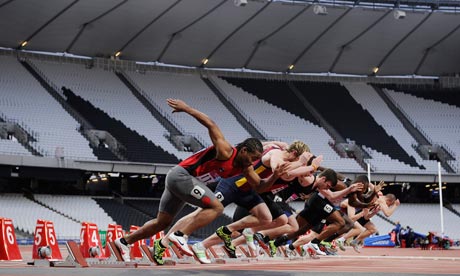
The cabinet minister in charge of the Olympics has insisted the government will not walk away from promises to use the Games to inspire young people to play more sport, despite research showing that numbers are stubbornly failing to rise.
Culture secretary Jeremy Hunt admitted to "mixed feelings" about the figures in Sport England's Active People survey. Published on Friday it showed that while the number of over 26-year-olds playing sport once a week has increased, among young people the numbers continues to fall. Thanks to a mild winter and increases in the number of people cycling and jogging, 15.3m people aged 16 and over are playing sport at least once a week, an increase of 500,000 on six months ago and a rise of 1.3m since London won the bid to host the Games in 2005.
Lord Coe's promise to inspire a generation through sport by hosting the Games is still a long way from being realised. The percentage of 16- to 25-year-olds playing sport once a week has declined since 2005.
No previous Olympics has ever sparked an increase in the number of people playing grassroots sport and Hunt admitted there was a "big challenge ahead".
He said a policy unveiled in January to target 60% of Sport England's £1bn spending, funded by the National Lottery and the exchequer, over five years at 14- to 25-year-olds would bear fruit. "Getting people to have sport as a habit for life has got to be at the heart of our sports strategy after the Olympics," said Hunt. "We haven't cracked that yet."
New "whole sport plans" will distribute £400m among governing bodies over the four years between 2013 and 2017, £80m less than over the previous four years.
Hunt refused to set a new participation target, having dropped the Labour government's aim of getting more than 1m more people to play sport three times or more a week by 2013. Friday's figures showed that only half that number had been added.
The culture secretary, whose future has been the subject of speculation as the Leveson inquiry has unfolded, also defended the Department for Education's decision to slash the ringfenced budget for school sport and insisted it would not harm the Olympic legacy push.
The shadow sports minister and Labour MP for Eltham, Clive Efford, said declining sports participation among young people reflected how misguided the government was to destroy the School Sports Partnerships, a national network of dedicated school sport co-ordinators.
"There is no coherent sport strategy from this government that is aimed at encouraging wide spread lifelong participation rates in sports and recreational activities," he said.
Hunt said: "Moving away from a ringfenced budget for school sport is not the same as cutting the budget. We've got more than half the schools in the country signed up for the School Games."
The School Games, introduced this year, is a national series of intra- and inter-school competitions that climaxes in the Olympic Park.
Hunt also urged visitors to stream into London during the Games, despite renewed fears about the size of the crowds expected to throng the capital.
Organisers increased the crowd control budget by a third after larger than expected numbers for the torch relay and the Queen's diamond jubilee. London 2012 organisers said on Friday that the torch had been seen by an estimated 4 million people so far, as it reached the halfway point of its 70-day tour around the UK
Hunt said people should not be put off coming into London, likening the Games to a house party and saying he was "absolutely thrilled" with the public mood, despite lingering concerns over transport, security and tickets.
"It is going to be disruptive this summer – to businesses, to people who live nearby, to Londoners. But it's also going to be the most fantastic summer in London's history. We're saying 'come to London, it's going to be fantastic'," said Hunt.
"There will be some disruption. But it's like when you have a big party at home, of course there is some clearing up to do, some organisation to do, some shopping that needs to be done in advance. It's very hard work but you do it because it's a fantastic thing to do."
Hunt said the scrutiny his department has faced during the Leveson inquiry had not affected the delivery of the Games.
There has been speculation over Hunt's position since the inquiry revealed the nature of links between his special adviser and a lobbyist employed by News Corporation while he was deciding whether to refer the company's bid for BSkyB to the Competition Commission.
"There were one or two hairy moments, for sure. But the Olympics project carried on. This is a portfolio where at different times different parts of the portfolio take up more time. The Leveson inquiry was an incredibly important thing to do. I'm very proud that we are the government that set it up and decided to bite the bullet and do something about the problems around the press. That takes time and it's right that it should," he said.
"The Olympic budget has been delivered with a contingency of roughly £500m remaining and we have addressed a number of the major operational issues we were concerned about."

